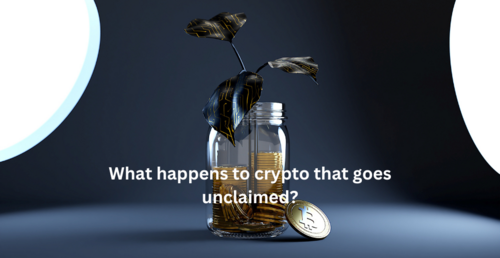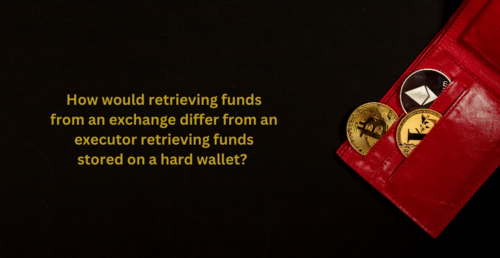
What happens to your cryptocurrencies when you die?

Digital assets such as cryptocurrencies pose some unique challenges when planning what happens to your investments when you die. Where does your crypto on an exchange go? What happens to crypto stored off an exchange on a hardware wallet? It can become quite complicated and, sometimes, impossible to retrieve the funds, but with proper planning it doesn’t have to be.
Brandon Sylvester, Quality and Control Manager in the Testamentary and Inter Vivos trust department at Sanlam Trust, a South African financial services provider, answered a few pressing questions about estate planning and cryptocurrencies.

It is recommended that the testator or testatrix, the person deciding what happens to their belongings when they die, together with the executor, the person legally appointed to execute the will, explicitly include all digital assets with detailed instructions about what should happen with these assets.
Nominate an executor: It is highly recommended that the executor of your estate should be trustworthy and tech-savvy enough to handle cryptocurrencies.
Cryptocurrency specifications: The testator should mention each cryptocurrency they own, as regulations governing cryptocurrencies may vary depending on the type of crypto asset.
Access details: The testator should provide detailed instructions about how to access these digital assets.
Don’t include the private key, username, and passwords to digital wallets in the will. This should be stored elsewhere, where a trusted person to the testator can provide the executor with access to the wallets. The testator must ensure they update the access details in case it changes. Without these passwords, the assets are impossible to retrieve.
Seek legal guidance: Considering the legal intricacies around cryptocurrencies, the testator should seek advice from a reputable institution where they can speak to a financial adviser knowledgeable about digital assets.
.png)
Cryptocurrencies are not automatically passed on to beneficiaries after death. The executor, as soon as they are appointed in terms of the letter of executorship, should arrange to get the access details from the trusted person.
Once they have control over the crypto, they need to ensure that the trusted person does not have further access to the crypto during the administration of the deceased estate.

According to our Senior Legal Advisor at Sanlam Trust, David Thomson, the jurisdiction in which the crypto is held and the terms of the customers’ purchase contract with the crypto exchange will be a key factor in determining what happens to unclaimed crypto.
In South Africa, the Administration of Estates Act 66 of 1965 only talks about money held by a person on another’s behalf, which could be a trustee, executor or agent.
Banks and exchanges are not agents of the client, it is purely a transactional relationship governed by the contract of service.
With regards unclaimed monies, after five years, the holder of funds belonging to a deceased person (for example a bank or exchange) must advertise in the Government Gazette. If still unclaimed, the exchange must pay the crypto to the Master of the High Court’s Guardians Fund. After 30 years with the Master, from the date of death, the money goes to the State if it’s still unclaimed.
With crypto, if the exchange has no idea the owner is deceased, Thomson reasons that the crypto could exist in perpetuity, just like ordinary fiat money, unless the contract says differently. If the principal lives overseas, then the foreign law would apply.

Crypto kept on an exchange is usually easier to retrieve, since it is held by the exchange on behalf of the testator. There is a likelihood that crypto exchanges are geared to handle requests from executors to gain access to the crypto, and have it placed in a crypto account in the name of the testator’s deceased estate, or sold, and transferred to the deceased estate’s bank account.
READ MORE: How does an executor access the crypto of a deceased
Crypto held in a hard wallet is relatively free from the risk of crypto exchange liquidations, however, it also comes with a difficult or nearly impossible task of retrieving the crypto should the testator pass away without providing the executor with the private keys or the steps to recovering this information.
The crypto may also be lost if held on a cold storage device where the individual forgot the private key or where the device is corrupted, damaged, or lost.
.png)
To date, we have received one case in which a testator left crypto to their heirs. Luckily, one of their heirs had the details necessary to access the crypto. We are currently developing a process in which the executor will take control of the crypto to administer it in the deceased estate.
In the digital age, the importance of a last will and testament extends beyond tangible assets. Today, a will must also encompass digital assets, from sentimental cloud-stored photos to digital investments like cryptocurrency. A financial adviser should provide guidance on the process of leaving cryptocurrencies and other digital assets in their will.
NB >>To invest in crypto, click HERE
NB >> Join Markethive - a Huge Community of Crypto Entrepreneurs (The First Market Network Built on Blockchain) click HERE
.png)
About: Andries vanTonder
Over 40 years selfemployed
He is a Serial Entrepreneur, an Enthusiastic supporter of Blockchain Technology and a Cryptocurrency Investor
Find me at my Markethive Profile Page | My Twitter Account | My Instagram Acount | and my Facebook Profile.
